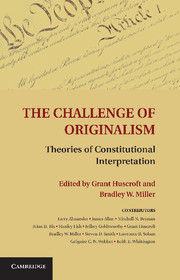Book contents
- Frontmatter
- Contents
- Preface
- Contributors
- The Challenge of Originalism: Theories of Constitutional Interpretation
- Part One Exposition and Defense
- 1 What Is Originalism? The Evolution of Contemporary Originalist Theory
- 2 The Case for Originalism
- 3 On Pluralism within Originalism
- Part Two Interpretation and Intention
- Part Three Originalism and Constitutional Settlement
- Part Four Challenges and Critiques
- Index
- References
1 - What Is Originalism? The Evolution of Contemporary Originalist Theory
from Part One - Exposition and Defense
Published online by Cambridge University Press: 07 October 2011
- Frontmatter
- Contents
- Preface
- Contributors
- The Challenge of Originalism: Theories of Constitutional Interpretation
- Part One Exposition and Defense
- 1 What Is Originalism? The Evolution of Contemporary Originalist Theory
- 2 The Case for Originalism
- 3 On Pluralism within Originalism
- Part Two Interpretation and Intention
- Part Three Originalism and Constitutional Settlement
- Part Four Challenges and Critiques
- Index
- References
Summary
Introduction
Debates over “originalism” have been a central focus of contemporary constitutional theory for three decades. One of the features of this debate has been disagreement about what “originalism” is. More worrisome is the possibility that the arguments between contemporary originalists and their opponents, the “living constitutionalists,” are confused – with each side of the debate making erroneous assumptions about the content of their opponent's theories.
The aim of this chapter is to clarify these debates by providing a history of contemporary originalism and then developing an account of the core or focal content of originalist theory. The history reveals that contemporary originalist theory has evolved – the mainstream of originalist theory began with an emphasis on the original intentions of the framers but has gradually moved to the view that the “original meaning” of the constitution is the “original public meaning” of the text. Even today, originalists disagree among themselves about a variety of important questions, including the normative justification for a constitutional practice that adheres to original meaning. Despite evolution and continued disagreement, however, contemporary originalist theory has a core of agreement on two propositions. First, almost all originalists agree that the linguistic meaning of each constitutional provision was fixed at the time that provision was adopted. Second, originalists agree that our constitutional practice both is (albeit imperfectly) and should be committed to the principle that the original meaning of the Constitution constrains judicial practice. The question whether living constitutionalists actually disagree with these core principles of originalist theory is a complex one – to which we shall return at the end of this chapter.
- Type
- Chapter
- Information
- The Challenge of OriginalismTheories of Constitutional Interpretation, pp. 12 - 41Publisher: Cambridge University PressPrint publication year: 2011
References
- 7
- Cited by



